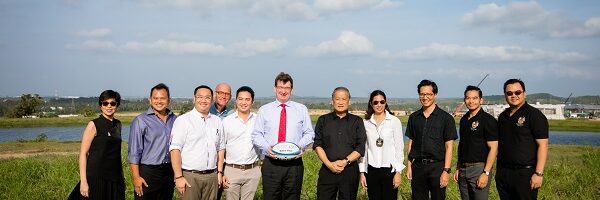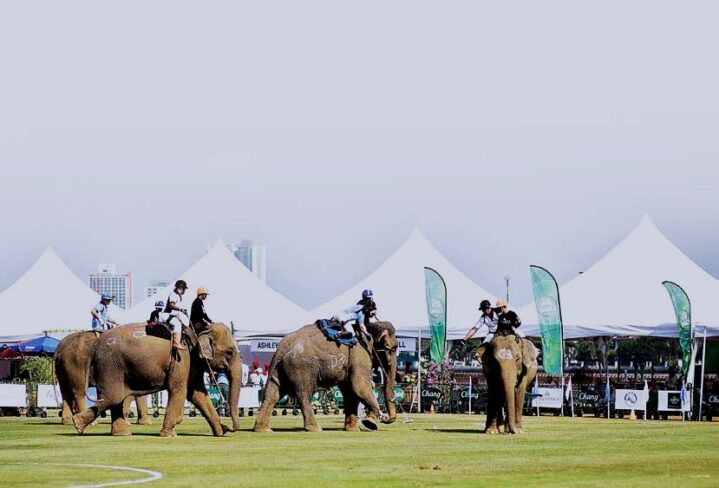
King’s Cup Elephant Polo – a Thailand treat
Pachyderms plus polo players – a perfect pageant
Elephants are synonymous with Thailand. The ‘Land of Smiles’ is home to about 3,000 of these friendly giants that live in the wild, with about the same number of ‘domesticated’ elephants living in villages and towns with their mahouts. Thailand is also home to a most unusual event that can only be seen in a few places around the world – elephant polo. The major event of the year is known as the King’s Cup, held in early March, in Bangkok. Its mandate is to help elephant related charities, and the tournament is overseen by the World Elephant Polo Association (WEPA). WEPA came into being in Nepal, in 1982, and was where the first ever elephant polo matches were played, at Tiger Tops. WEPA has strict rules concerning the welfare and care of any of the elephants competing under its auspices, and oversee all polo matches played in Thailand and Nepal.
In Thailand the sport was first brought to Hua Hin (three hours to the south of Bangkok) by long term Thai resident, Swede Chris Stafford, while he was working for the Anantara Hotel Group. This was where the first King’s Cup was played, in 2001. Anantara has developed the event over the last 16 years, and today it is one of the most successful charitable pageants in Thailand. The King’s Cup Elephant Polo is all about the elephants, and everyone involved is passionate about elephants and their welfare. None of the competing elephants are captured from the wild, and are all drawn from the domestically raised population. The care of the elephants is of paramount importance. They receive the services of a team of onsite vets, their time on the pitch is limited to only 28 minutes per day, and they are given any vitamin supplements and or other medication that they might need. It is a welcome holiday for them from their usual trekking or other duties.
For the last two years the fun and games have been held on land adjoining the Anantara Riverside Resort, on the banks of the Chaophraya River, the current home. Marquees, tents, entertainment areas, and food stalls spring magically up to create a carnival like atmosphere that attendees new and old never fail to enjoy. Wining, dining, and cheering on your chosen team.
On day one of the event held this year it all kicked off with a Brahmin blessing ceremony of the elephants. They had been transported by truck from Surin, a province in the Northeast of Thailand, known as ‘Changwat Chang’ (elephant province).
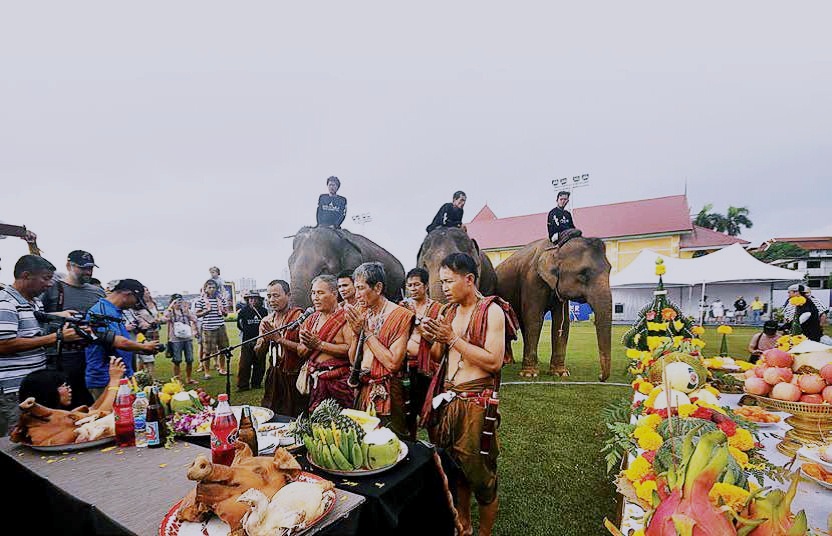

This was followed up with a traditional Thai dance performance by beautiful young Thai ladies, after which a gigantic fruit buffet was waiting for the expectant elephants. The tons of fruit and veg that had been laid out on trestle tables was made short work of by the munching pachyderms. An elephant eats about 250kg of food per day, and over the course of the four days the 25 elephants that were to play consumed 7,200 bunches of pineapples, 600 bunches of bananas, 9,000 sticks of sugar cane, and 12 tonnes of elephant grass!
Trucks were continually arriving throughout the four days to deliver food to the private compound of the elephants, away from the noise and crowds. Last year it had been noticed that the elephants were loath to approach the goal nearest to the river, and it was realised that the noise of the engines on the boats plying the river made them feel uncomfortable. Therefore, this year a line of tents housing exhibitors displays was placed at that end of the polo pitch to mute the sounds of the riverine life. The private compound at the rear of the showground was where the team of vets – and an elephant osteopath from the UK, Tony Nevin – took care of all the pachyderms needs.
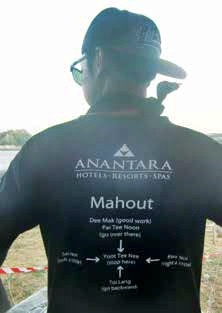
And in the afternoon the first matches were played. The mahouts, in general, do not speak English, and the players do not speak Thai, but there is an innovative way that they communicate with each other; the mahout wears a shirt with phonetically printed Thai written on the back so that the players can read these instructions, and tell the mahout sitting in front of him to take the elephant forwards, or backwards, turn left or right. There are six elephants on the pitch, and none of them have played polo before. Each elephant has both a player and a mahout on its back. A chukka lasts seven minutes, at which time the players change ends. But in elephant polo they also swap elephants. This is to level the playing field, as some elephants are faster, and more rapid on the turn.
Trucks were continually arriving throughout the four days to deliver food to the private compound of the elephants, away from the noise and crowds. Last year it had been noticed that the elephants were loath to approach the goal nearest to the river, and it was realised that the noise of the engines on the boats plying the river made them feel uncomfortable. Therefore, this year a line of tents housing exhibitors displays was placed at that end of the polo pitch to mute the sounds of the riverine life. The private compound at the rear of the showground was where the team of vets – and an elephant osteopath from the UK, Tony Nevin – took care of all the pachyderms needs.
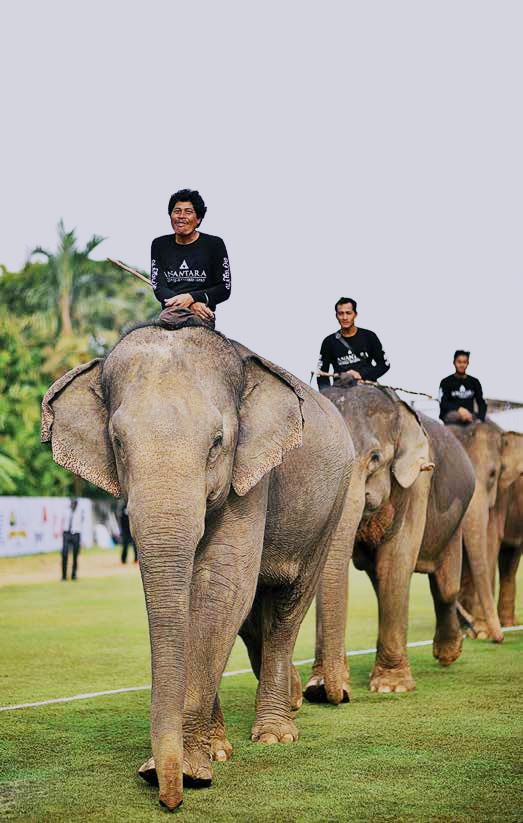
And in the afternoon the first matches were played. The mahouts, in general, do not speak English, and the players do not speak Thai, but there is an innovative way that they communicate with each other; the mahout wears a shirt with phonetically printed Thai written on the back so that the players can read these instructions, and tell the mahout sitting in front of him to take the elephant forwards, or backwards, turn left or right. There are six elephants on the pitch, and none of them have played polo before. Each elephant has both a player and a mahout on its back. A chukka lasts seven minutes, at which time the players change ends. But in elephant polo they also swap elephants. This is to level the playing field, as some elephants are faster, and more rapid on the turn.
But elephants are quick learners, and as the tournament proceeded the matches became faster and more fluid. Day two was ‘Kid’s Day’, wherein parties of schoolchildren from Bangkok and further afield came to learn all about elephants at special classes, and had the opportunity to get up close to them. The young visitors included disabled and autistic kids, who were thrilled to meet the gentle giants face to face. Matches and fun continued throughout the day.
The third day was ‘Ladies Day’, informally known as the Thai Ascot. As you might imagine Bangkok’s fairest were in attendance, bedecked in their finery, and showing off their stunning headwear. The dazzle they created outshone even the bright sun. Matches again continued throughout the day, and after an evening fashion show, the winner of the Best Dressed (and hatted) Lady was announced. 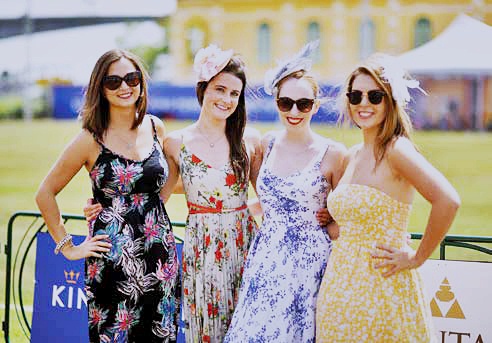 By this time the elephants had really got into it, and did not even need to obey the instructions of their mahouts so much. And when one of the players’ protective helmets fell to the ground his elephant picked it up with its trunk and handed it back to him without any instructions coming from anyone.
By this time the elephants had really got into it, and did not even need to obey the instructions of their mahouts so much. And when one of the players’ protective helmets fell to the ground his elephant picked it up with its trunk and handed it back to him without any instructions coming from anyone.
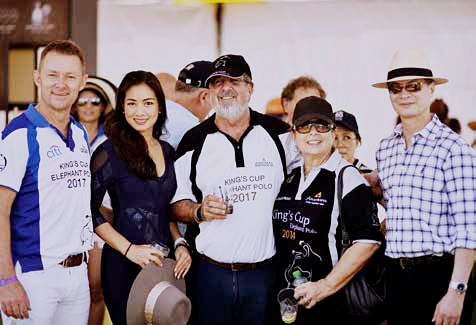 It seemed as though they knew what was expected of them, and this made the matches even more exciting to watch. The victorious and elated trumpeting roar of the elephants as they celebrated scoring a goal even drowned out the commentary over the PA by compere Chris Stafford. The fourth and final day featured live jazz performances, as well as the teams battling it out to be crowned champion. There had been 10 teams in the competition, but of course there could have been only one winner. Some of the teams were not really expected to win, considering that King Power (champions of the previous two years) had experienced polo players, Casillero del Diablo had help from Argentine experts, and Mekhong had polo playing superstars Uday and Adang Kalaan playing for them. But all teams without fail gave of their best, especially the fiercely competitive All Blacks team of Price Waterhouse Coopers, featuring Olo Brown, and Charlie ‘don Juan’ Riechelmann. The ten teams comprised 40 players, coming from all walks of life; sportsmen, supermodels, actors and actresses, businessmen, et al. They come to Thailand once a year to meet up at the King’s Cup, and have become much like an extended family, or an exclusive club. They give of their time for free, and are bewildered how they can have so much fun whilst still raising so much money for elephant charities. This year 4MB was raised by the sponsors and spectator attendance of 5,000 souls, made up of both the expat community, and tourists. Which has brought the grand total to 1.4 million USD, since the tournaments began. And it has all gone towards helping elephants living in Thailand, and other nearby Asian countries.
It seemed as though they knew what was expected of them, and this made the matches even more exciting to watch. The victorious and elated trumpeting roar of the elephants as they celebrated scoring a goal even drowned out the commentary over the PA by compere Chris Stafford. The fourth and final day featured live jazz performances, as well as the teams battling it out to be crowned champion. There had been 10 teams in the competition, but of course there could have been only one winner. Some of the teams were not really expected to win, considering that King Power (champions of the previous two years) had experienced polo players, Casillero del Diablo had help from Argentine experts, and Mekhong had polo playing superstars Uday and Adang Kalaan playing for them. But all teams without fail gave of their best, especially the fiercely competitive All Blacks team of Price Waterhouse Coopers, featuring Olo Brown, and Charlie ‘don Juan’ Riechelmann. The ten teams comprised 40 players, coming from all walks of life; sportsmen, supermodels, actors and actresses, businessmen, et al. They come to Thailand once a year to meet up at the King’s Cup, and have become much like an extended family, or an exclusive club. They give of their time for free, and are bewildered how they can have so much fun whilst still raising so much money for elephant charities. This year 4MB was raised by the sponsors and spectator attendance of 5,000 souls, made up of both the expat community, and tourists. Which has brought the grand total to 1.4 million USD, since the tournaments began. And it has all gone towards helping elephants living in Thailand, and other nearby Asian countries.

So, this year, after intense competition, the final came to a showdown between King Power and Mekhong. It was an exciting, nailbiting final, and in the last two minutes of the final chukka the Kalaan brothers – Uday and Adang, – of the Mekhong team, scored three times, thereby winning by 11 points to 10.
The new champions were presented with their winning trophy by Royal Representative Privy Councillor H.E. Air Chief Marshal Chalit Pukbhasuk, and CEO of the Minor Corporation, William (Bill) Heinecke, and his wife Kathy. The King’s Cup Elephant Polo is now firmly entrenched as a ‘must see’ in Thailand …
Mark your calendar now for next year! … same elephant time, same elephant place!
Robin Westley Martin is a journalist who has lived in Thailand for 30 years, and has contributed his expertise to many publications. His first position was as News Editor at Business in Thailand, after which he moved on to Hotel and Travel and Kinnaree, where he was Assistant Editor. He has been published in newspapers in Thailand and overseas, such as The Nation and The Sunday Times. Robin currently works on a freelance basis, covering a wide range of genres.



